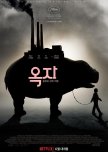"I'm an animal lover!"
Bong Joon-ho's 'Okja' depicts a conflict between a corrupt corporation and a radical animal rights organisation over a giant porcine beast, with an innocent girl being caught in the crossfire. This charming yet brutal satire reveals the hypocrisy of the phrase "animal lover", a phrase that the corrupt fat-cats of the Mirando corporation and the not-terrorists of the Animal Liberation Front would both use to describe themselves. Director Bong's triumph is ripping away the idealistic facades of both sides- revealing the slaughterhouses behind the smiles and saccharine PR of greedy corporations, but also the cruel sacrifices made by animal rights groups for the sake of a 'greater good'. Yet given how we see Mija catching and eating fish, it is made clear that this film's meaning can't be cut down to 'meat is murder'- rather, 'Okja' is a condemnation of how the lives of animals- sensitive beings that can feel fear and pain- can be callously invalidated for the sake of human agendas. We can eat meat if we choose- but can we really love animals when we put their necks on the chopping block and our money in the pockets of their murderers? Can we really justify the consumption of those cute critters with bullshit slogans like 'eco-friendly' and 'GMO-free'?
Director Bong demonstrates his capacity for drastic tonal shifts once more to magnetise viewers; they laugh at the farcical chase scenes and smile at the friendship between Mija and Okja, and then are walloped in the guts as they hear the screams of anguished pigs in abattoirs and testing rooms. Similarly, his decision to shoot in both rural Korea and bustling New York contrasts the large-scale ambitions of Mirando co. and the ALF with Mija's simple desire to have her only friend back, adding moderation and a human touch to what could have been an impersonal clash of black-and-grey forces. Generally, the ensemble international cast performed well; Tilda Swinton was particularly impressive in her duel role as the Mirando sisters. Her ability to contrast Lucy's narcissism and false cheer against Nancy's cold pragmatism and barking assertiveness demonstrated the duality of greedy and opportunistic corporations; their flowery public front and their aggressive, business-like drive. Without Nancy's sunglasses and hairstyle, I would've been hard-pressed to notice the sisters' singular actress and I hear that Swinton was also amazing in Snowpiercer, which is next on my list. Seo-Hyeon Ahn, despite her young age, was more than a match for the Western performers, capturing Mija's fighting spirit and love for Okja with sincerity and poignance. And I was surprised to know that before her excellent turn as the crazy maid in 'Parasite', Jeong-eun Lee was Okja's voice actress- just how could a human convey such animalistic grunts, roars and squeals?
Unfortunately and in more than one way, 'Okja' is far more feast than famine. On several occasions, Director Bong overshoots with the satire; his flamboyant bigwigs are often transparent and hard to take seriously with their childish histrionics, not helped in the slightest by the overacting that breaks out on several occasions. In my opinion, the film's didacticism is far too thinly veiled; replace the superpigs with regular livestock and many scenes become identical to the 'do you know where you food comes from!?!?!?!?' videos that are shoved in your face by Peta or advertised on your local traffic light. But in part, these flaws are redeemed by a powerful ending that packs both hope and tragic realism.
As I wrote this review, I was tucking into a nice big plate of marinated ribs. Though I don't think that I will stop eating meat, I will certainly know to not inject any sense of 'rightness' into the deed.
P.S. I don't get how this film is championed by vegans for gods sake you literally see Mija and Gramps catching fish and making fish stew.
Director Bong demonstrates his capacity for drastic tonal shifts once more to magnetise viewers; they laugh at the farcical chase scenes and smile at the friendship between Mija and Okja, and then are walloped in the guts as they hear the screams of anguished pigs in abattoirs and testing rooms. Similarly, his decision to shoot in both rural Korea and bustling New York contrasts the large-scale ambitions of Mirando co. and the ALF with Mija's simple desire to have her only friend back, adding moderation and a human touch to what could have been an impersonal clash of black-and-grey forces. Generally, the ensemble international cast performed well; Tilda Swinton was particularly impressive in her duel role as the Mirando sisters. Her ability to contrast Lucy's narcissism and false cheer against Nancy's cold pragmatism and barking assertiveness demonstrated the duality of greedy and opportunistic corporations; their flowery public front and their aggressive, business-like drive. Without Nancy's sunglasses and hairstyle, I would've been hard-pressed to notice the sisters' singular actress and I hear that Swinton was also amazing in Snowpiercer, which is next on my list. Seo-Hyeon Ahn, despite her young age, was more than a match for the Western performers, capturing Mija's fighting spirit and love for Okja with sincerity and poignance. And I was surprised to know that before her excellent turn as the crazy maid in 'Parasite', Jeong-eun Lee was Okja's voice actress- just how could a human convey such animalistic grunts, roars and squeals?
Unfortunately and in more than one way, 'Okja' is far more feast than famine. On several occasions, Director Bong overshoots with the satire; his flamboyant bigwigs are often transparent and hard to take seriously with their childish histrionics, not helped in the slightest by the overacting that breaks out on several occasions. In my opinion, the film's didacticism is far too thinly veiled; replace the superpigs with regular livestock and many scenes become identical to the 'do you know where you food comes from!?!?!?!?' videos that are shoved in your face by Peta or advertised on your local traffic light. But in part, these flaws are redeemed by a powerful ending that packs both hope and tragic realism.
As I wrote this review, I was tucking into a nice big plate of marinated ribs. Though I don't think that I will stop eating meat, I will certainly know to not inject any sense of 'rightness' into the deed.
P.S. I don't get how this film is championed by vegans for gods sake you literally see Mija and Gramps catching fish and making fish stew.
Was this review helpful to you?
























